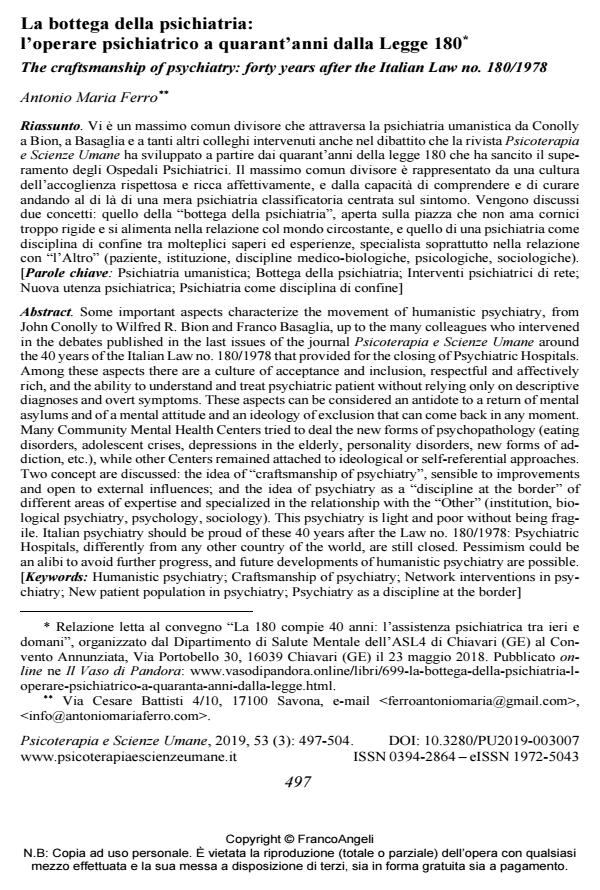La bottega della psichiatria: l’operare psichiatrico a quarant’anni dalla Legge 180
Titolo Rivista PSICOTERAPIA E SCIENZE UMANE
Autori/Curatori Antonio Maria Ferro
Anno di pubblicazione 2019 Fascicolo 2019/3
Lingua Italiano Numero pagine 8 P. 497-504 Dimensione file 49 KB
DOI 10.3280/PU2019-003007
Il DOI è il codice a barre della proprietà intellettuale: per saperne di più
clicca qui
Qui sotto puoi vedere in anteprima la prima pagina di questo articolo.
Se questo articolo ti interessa, lo puoi acquistare (e scaricare in formato pdf) seguendo le facili indicazioni per acquistare il download credit. Acquista Download Credits per scaricare questo Articolo in formato PDF

FrancoAngeli è membro della Publishers International Linking Association, Inc (PILA), associazione indipendente e non profit per facilitare (attraverso i servizi tecnologici implementati da CrossRef.org) l’accesso degli studiosi ai contenuti digitali nelle pubblicazioni professionali e scientifiche.
Vi è un massimo comun divisore che attraversa la psichiatria umanistica da Conolly a Bion, a Ba-saglia e a tanti altri colleghi intervenuti anche nel dibattito che la rivista Psicoterapia e Scienze Umane ha sviluppato a partire dai quarant’anni della legge 180 che ha sancito il superamento de-gli Ospedali Psichiatrici. Il massimo comun divisore è rappresentato da una cultura dell’accoglienza rispettosa e ricca affettivamente, e dalla capacità di comprendere e di curare an-dando al di là di una mera psichiatria classificatoria centrata sul sintomo. Vengono discussi due concetti: quello della "bottega della psichiatria", aperta sulla piazza che non ama cornici troppo rigide e si alimenta nella relazione col mondo circostante, e quello di una psichiatria come discipli-na di confine tra molteplici saperi ed esperienze, specialista soprattutto nella relazione con "l’Altro" (paziente, istituzione, discipline medico-biologiche, psicologiche, sociologiche).
Parole chiave:Psichiatria umanistica; Bottega della psichiatria; Interventi psichiatrici di rete; Nuova uten-za psichiatrica; Psichiatria come disciplina di confine
Antonio Maria Ferro, La bottega della psichiatria: l’operare psichiatrico a quarant’anni dalla Legge 180 in "PSICOTERAPIA E SCIENZE UMANE" 3/2019, pp 497-504, DOI: 10.3280/PU2019-003007